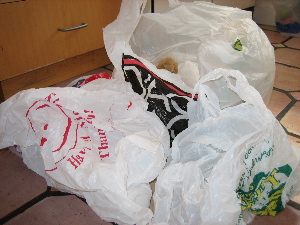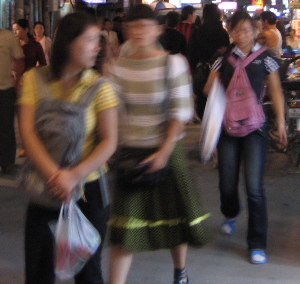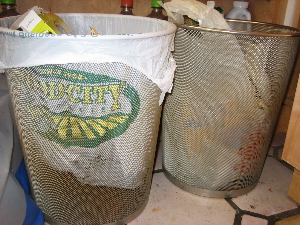
Here's a familiar scenario. You go to the grocery store, get your items and, at the checkout counter, a bagger puts your items into several plastic bags. The bags are never filled to capacity, sometimes only a few items are put into each bag, and usually the bags are doubled. You then head out of the store with many more bags than you need. And when you get home, after you unload your groceries, you'll stuff all these bags into an already large sack of plastic bags from previous visits.

Since plastic grocery bags were introduced in the 1960s, the nation's — as well as the world's — environment is now plagued with this non-biodegradable pollutant. Billions and billions of these plastic bags are consumed each year, only to end up clogging up landfills — never to biodegrade — or littering the streets or disturbing nature's balance by choking wildlife and plugging up waterways. But using paper bags as an alternative is not really the best solution. An excellent article by National Geographic says that making plastic bags is actually less harmful to the environment than making paper bags. Paper bags do biodegrade faster but, if placed in a landfill, can take the same amount of time as plastic, which is thousands of years. Plastic bags are an environmental scourge that have many countries worldwide already addressing the problem.

Bans
Plastic bags have created such an environmental problem that many countries as well as cities now have full or partial bans on the bags. According to reusablebags.com, several African countries as well as Asian countries have banned plastic bags. Australia and the city of Paris are actively moving forward for complete bans on non-biodegradable plastic bags.
Taxing bags
And in some countries that still allow plastic bags, in order to cut down on consumption, customers must actually purchase the bags at the checkout counter. European countries are a forerunner that actively charge their customers for plastic bags, so most savvy consumers carry reusable canvas bags to avoid the charge.
Problem with the United States
The "Live free or die" mantra was started during the War of Independence, and it is still in many ways exactly how we Americans feel we should be able to live. We are a "throw-away" society and feel it is our right to use and throw away as many plastic bags as we want. Taxing people's right to plastic bags also seems contrary to being American since we have it drilled into our heads that taxes are bad. Our resources for landfills and wide-open spaces are also much more abundant than smaller countries such as in Europe, so we don't feel like we're running out of room.
Partial solutions:
Buy and use canvas bags
Some stores give customers a few cents off for each canvas bag they bring in and use instead of plastic bags. Another advantage is that canvas bags hold more objects and are very sturdy which leads to using fewer bags to bring your groceries home in. The advantages of canvas bags also reduce the amount of plastic bags that end up in landfills. Think about it — if you go to the grocery store once a week and use two canvas bags instead of getting say six plastic bags, that's 312 fewer plastic bags consumed by you alone in one year.

Recycling programs
Some grocery stores have bag-recycling programs, where you can drop off your plastic bags at the store before you go shopping. The state of California recently created a bill that makes recycling plastic bags mandatory. There are school programs that let kids team up with stores to help recycle their plastic bags and, by doing so, receive incentives. Reuse your own pile of plastic bags for garbage or storage — the more use you get out of one bag, the less the demand for new plastic bags.

keeping the earth ever green
- Follow us on Twitter: @inthefray
- Comment on stories or like us on Facebook
- Subscribe to our free email newsletter
- Send us your writing, photography, or artwork
- Republish our Creative Commons-licensed content

